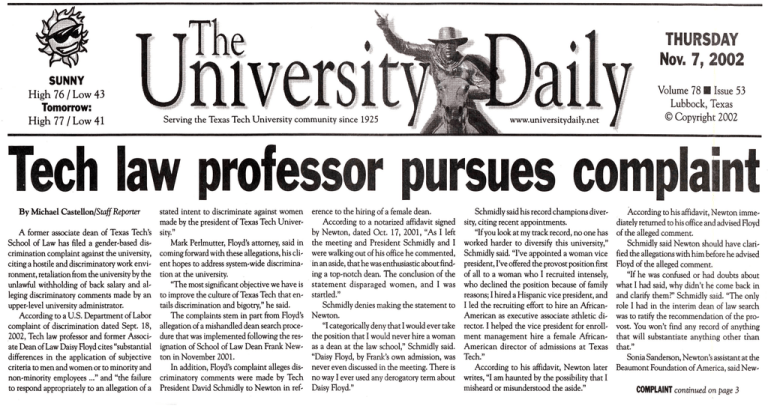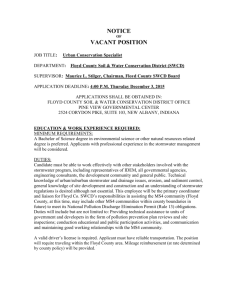Tech law profess r pursues comp t o
advertisement

THURSDAY Nov. 7, 2002 SUNNY High 76/ Low 43 Tomorrow: High 77 / Low 41 Volume 78 • Issue 53 Lubbock, Texas © Copyright 2002 Serving the Texas Tech University community since 1925 Tech law professor pursues complaint By Michael Castellon/Staff Reporter A former associate dean of Texas Tech's School of Law has filed a gender-based discrimination complaint against the university, citing a hostile and discriminatory work environment, retaliation from the university by the unlawful withholding of back salary and alleging discriminatory comments made by an upper-level university administrator. According to a u.s. Department of Labor complaint of discrimination dated Sept. 18, 2002, Tech law professor and former Associate Dean of Law Daisy Floyd cites "substantial differences in the application of subjective criteria to men and women or to minority and non-minority employees ... " and "the failure to respond appropriately to an allegation of a stated intent to discriminate against women erence to the hiring of a female dean. made by the president of Texas Tech UniverAccording to a notarized affidavit signed by Newton, dated Oct. 17, 2001, "As I left sity." Mark Perlmutter, Floyd's attorney, said in the meeting and President Schmidly and I coming forward with these allegations, his cli- were walking out of his office he commented, ent hopes to address system-wide discrimina- .in an aside, that he was enthusiastic about finding a top-notch dean. The conclusion of the tion at the university. "The most significant objective we have is statement disparaged women, and I was to improve the culture of Texas Tech that en- startled." tails discrimination and bigotry," he said. Schmidly denies making the statement to The complaints stem in part from Floyd's Newton. "I categorically deny that I would ever take allegation of a mishandled dean search procedure that was implemented following the res- the position that I would never hire a woman ignation of School of Law Dean Frank New- as a dean at the law school," Schmidly said. "Daisy Floyd, by Frank's own admission, was ton in November 200l. In addition, Floyd's complaint alleges dis- never even discussed in the meeting. There is criminatory comments were made by Tech no way I ever used any derogatory term about President David Schmidly to Newton in ref- Daisy Floyd." Schmidly said his record champions diversity, citing recent appointments. "If you look at my track record, no one has worked harder to diversify this university," Schmidly said. "I've appointed a woman vice president, I've offered the provost position first of all to a woman who I recruited intensely, who declined the position because of family reasons; I hired a Hispanic vice president, and I led the recruiting effort to hire an AfricanAmerican as executive associate athletic director. I helped the vice president for enrollment management hire a female AfricanAmerican director of admissions at Texas Tech." According to his affidavit, Newton later writes, "I am haunted by the possibility that I misheard or misunderstood the aside." According to h is affidavit, Newton immediately returned to his office and advised Floyd of the alleged comment. Schmidly said Newton should have clarified the allegations with h im before he advised Floyd of the alleged comment. "If he was confused or had doubts about what I had said, why didn't he come back in and clarify them?" Schmidly said. "The only role I had in the interim dean of law search was to ratify the recommendation of the provost. You won't find any record of anything that will substantiate anything other man that." Sonia Sanderson, Newton's assistant at the Beaumont Foundation of America, said New- COMPLAINT continued on page 3 Complaint CONTINUED FROM PAGE 1 ton was aware of the affidavit but was unavailable for comment. According to a letter addressed to members of the dean search committee dated Jan. 8, 2002, Floyd describes feeling threatened by Schmidly during a meeting that occurred Dec. 14. According to Floyd's letter to committee members she felt threatened, "when Dr. Schmidly said that he would 'go after' anyone who 'signed a witness statement' against him and that he was not 'going to let anyone get away with this.' The second occurred several minutes later and was to the effect that one should 'think twice' before repeating any allegation based on this alleged incident.'" However, Schmidly said his comments were taken out of context. "What I meant to convey was that ;'Ji I'm going to stand up for my character," Schmidly said. "If I had that to do all over again, I'd probably be a lot calmer, but this was just sprung on me, and I was upset. Apparently, it came off as threatening to some of these women, but in no way did I threaten those women." Floyd declined to com~ent about specific accusations made in her complaint, but in a prepared statement to The University Daily , she wrote, "There is a pattern of discrimination at Texas Tech, which I believe is damaging to the university and to all members of the university community. Equally as troubling as the discrimination itself is that university leaders respond to people who raise concerns about discrimination by 'shooting the messenger.' This consistent response includes stonewalling, threats and retaliation." Floyd claims the university's withholding of an administrative supplement to her salary is an action of retaliation based on her speaking out against gender discrimination at the university, according to a letter to Tech Chancellor Dr. David Smith dated March 28, 2002. "Despite repeated requests, the university has not returned the wrongfully withheld salary ... This action fits the classic pattern of retaliation specifically prohibited by TItle VII," according to her letter to Smith. Floyd resigned as associate dean Dec 6, 2001. She currently serves as a professor of law at the university. According to her letter addressed to law faculty members dated June 7, 2002, Floyd writes, "Upon receiving my paycheck for the January pay period, I learned that my salary had been reduced without prior notice to me." In her letter, Floyd said the reduction reflected repayment of an administrative supplement that she had paid during the fall semester while serving as associate dean. Smith responds to Floyd's allegations of wrongfully withheld portions of her salary in a letter dated April 10, 2002. "I believe that your salary accurately reflects the revised reduction in your workload," the letter said. In his response, Smith recommend the law school assign added duties to Floyd, thus supplementing her salary to the equivalent as it was while serving as associate dean. Perlmutter said changes in Floyd's salary following her resignation as associate dean were illegal and in retaliation of Floyd's outspoken behavior against discrimination. "We have little doubt our testimony at trial will show that she is not receiving equal pay for equal work compared to similarly-situated, male faculty," he said. Smith, who met with Floyd following her initial complaints and has reviewed her allegations, said he was unable to find evidence supporting Floyd's allegations. "If you look at the trends, this came from an issue of here say, to gender and then to race," Smith said. "With what I see in the documentation, I have trouble following this. These issues are tough ones due to the emotions involved, but I stand by our findings." Tech General Counsel Pat Campbell said Floyd's complaints have been examined in a lengthy investigation by the university and no wrong- . doing was found to have taken place. "We've been looking at this and talking to people 15 seconds after we heard Daisy Floyd made these allegations," Campbell said. "Had we found anything that supported what Daisy said, we would have taken action." Campbell said the university is preparing to defend itself against Floyd's allegations if the case goes to courr. "We'll be working on this until it goes to trial," Campbell said. "Her salary is a dead done. As far as her allegations of being constructively discharged, I'm ready to go to trial on that." In her statement to The UD, Floyd outlines her decision to bring action against the university. "I will continue to call for change and improvement," Floyd writes. "I tell my children and my students that they should stand for truth and justice, even if doing so is difficult. I cannot look them in the eye and tell them that unless I am Willing to do it myself." Perlmutter said his client is prepared to take her case to trial. "The bottom line is that the dutcome of the trial is unimportant," Perlmutter said. "What we're looking for is the university to acknowledge that they are acting on bigotry in the appointment processes. We want them to create an open and fair climate for all members of the university." Smith said he is concerned how the allegarions will affect students and faculty. "I do have a passion for this university and this law school, and that has to prevail," Smith said. "I'm now just worried about the healing process. I'm extremely worried about the students and the faculty."

